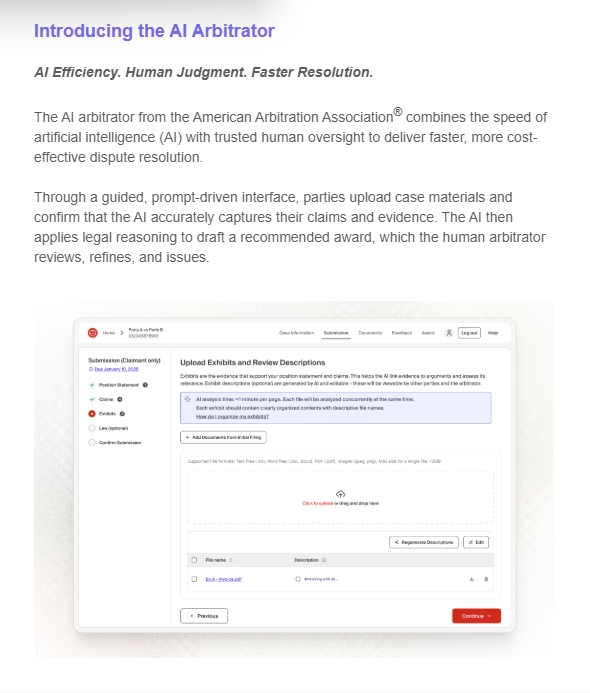Current Issues in Arbitration

Hi folks, I've been a bit swamped with work but none of it has triggered any brilliant practice insights. So instead I thought I'd comment quickly on a couple of arbitration issues that have broken into the larger conversation.
I have an arbitrator colleague with who I often discuss Artificial Intelligence, and she forwarded me an email she received from the American Arbitration Association marketing AI Arbitration. "The AI Arbitrator . . . combines the speed of AI with trusted human oversight to deliver faster, more cost-effective dispute resolution." So far this is only be offered for two-party construction disputes that are document only. The parties upload their documents and contract, and the AI Arbitrator issues an award. "Trusted human oversight" presumably means a human (but not an arbitrator) will read the award before it is sent to the parties.
I've written about Labor Relations and AI before. I have a hard time imagining that this will catch on. Even if it gains traction in the construction or medical malpractice arena, I think it's unlikely to be used to interpret a collective bargaining agreement. I've often believed that the parties select us because we are human, not despite that fact. They want the reader of their contract to bring knowledge and experience of the workplace that exists outside of the written language of the agreement. The arbitrator also needs to be able to read the silent politics of the particular dispute in the context of that particular work site.
There's a reason that arbitrators do not rely on the awards of other arbitrators to make their decisions. Every CBA is applied in the unique context in which the parties find themselves to have the dispute. Another award (or Large Language Model) might have insightful ideas, but an arbitrator only applies the CBA to a specific set of facts, and AI can't do that yet (or probably ever).
But I'm an arbitrator. Maybe the practitioners who read this will have some other ideas. Please let me know what you think!
The other topic I want to discuss is the Faster Labor Contracts Act, a strangely bipartisan effort to reduce the amount of time it takes for a union and employer to get a first contract after unionization. I say strangely bipartisan because labor law reform is usually the province of Democrats but in this case, Senator Josh Hawley and several House Republicans also support the legislation.
It can take several years for parties to reach a first time contract, assuming they are able to do so before the employer claims that the union has lost majority support. The FLCA proposes that parties who are unable to reach an agreement go to an arbitration process to reach their first contract. This is similar to the more expansive PRO Act that Democrats proposed a couple years ago.
The FLCA has come under fire from critics for turning the contract over to a third party, without understanding what that arbitration process really is. On Labor published this helpful rejoinder to the critics, What Critics of the “Faster Labor Contracts Act” Get Wrong, that is fairly comprehensive except that it misses one nuance about the FLCA process.
Under the FLCA, the parties would each select a party arbitrator, i.e. one union representative and one management representative, for an arbitration panel. The parties (or those party arbitrators) would select a third neutral arbitrator. At no time would the parties' interests be out of the consideration of the arbitration panel. The neutral arbitrator would work collaboratively with the party arbitrators and all three would consider the factors at issue in that workplace. Critics concerned that an "outsider" who knows "nothing" about the workplace miss (or ignore) that the parties remain critical to the resolution of the dispute. The neutral is not ignorant, either; they are selected because of their familiarity with an industry and with collective bargaining. They have had ideas and insights from other collective bargaining agreements that would resolve their present case.
So far, the FLCA hasn't moved past being referred to the Senate Health, Education, Labor and Pension Committee. I hope that the criticism of this bill doesn't obscure the value this process could bring to newly unionized workplaces.
I try to send an email every two weeks, but I will probably kick it to the three weeks because of the Thanksgiving holiday. Please let me know if there any topics you'd like me to address!


